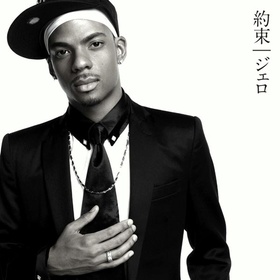Even though American Enka-singing sensation JERO is being proclaimed at the “first black Enka singer” in Japan, I would like to claim him as one of us.
JERO is one of the newest ‘gaijin’ (foreigner) talents to make their mark on the Japanese entertainment scene. Following the release of his first recording, Covers, in 2008, and subsequent Yakusoku (“Promise”) in 2009, JERO has become a popular guest on the TV talk show circuit. While he gets away with visually challenging the genre’s inherent stereotypes in a way that celebrates his “gaijinness” with in-your-face hip hop panache, he balances this all with a sensitive smile and polite manner that endears him to every Enka-loving ‘obaasan’ in Japan.
The script of his career thus far reads like any good enka song. He was greatly influenced by his Japanese grandmother, Takiko, who met his African American grandfather serviceman at a dance during World War Two. They eventually married, had a daughter, Harumi, then moved to Pittsburgh where JERO was born Jerome Charles White, Jr. in 1981. JERO grew up listening to enka with Takiko and studying Japanese from a young age. After graduating from the University of Pittsburgh in 2003, he moved to Japan, making his living as an English teacher and computer engineer, all the while actively pursuing his promise to his grandmother that he would become an enka singer and one day perform on the annual NHK TV Kohaku Uta Gassen year-end show. He kept both promises but, sadly, only after Takiko passed away in 2005.
When I first watched JERO on youtube, I thought that I had entered the wrong name. JERO dresses like a hip hop artist, baggy clothes and ball cap at a defiant tilt and often performs accompanied by a team of hip hop dancers. It’s a tantalizing hybrid of styles that most in Japan seem to be taking in stride. While the Japanese media is making much of JERO being “African American”, my friends in Japan tell me that he is largely being recognized as the talented young singer he is and that being black isn’t an issue there as “many, many Japanese hip hop singers,” as one astute friend points out.
Popular music in Japan is still uniquely “Japanese” as the industry there still thrives on mostly home grown talent versus American and British imports. The domestic music scene is a fascinating one to behold as everything is tightly orchestrated and controlled down to the place of every last hair and swipe of makeup. Artists know their place and rarely, if ever, make statements about social conditions as some are apt to do in other cultures. Even the most ‘cutting edge’ acts rarely challenged the status quo.
Nikkei Who ‘Made It’ in Japan
When I asked my friend in Osaka, Tak Matsuba, about other Nikkei singers in Japan, he wrote: “I understand there are several South American Nikkei Enka singers like, Oshiro Vanessa (Argentine), Minami Kanako (Brazilian) and there was a male Peruvian or Chilean, but I can't recall the name. He struggled for years in Japan and in Okinawa before he finally made it.” Another American Nikkei singer, Angela Aki, is also enjoying immense popularity in Japan now.
“I think the country had their first real encounter with blacks after World War II when the America Occupation Forces brought black GIs to Japan,” Matsuba continues. “The troops were segregated then and certain army camps had all black personnel. There was prejudice amongst the Occupation Forces themselves; the Japanese saw this and some took sides. As always, some were for the underdog to some extent, but I think it was more of an economical thing. They weren't too concerned about color; if it put a meal on the table that was fine. The prejudice among the Japanese, if there was any, was more in the ‘better off’ community,” says Matsuba.
As I write this article, I am aware of the frustration that identifying oneself as “Nikkei” engenders. We’re slotted according to generation right off the bat. The kids of my friends who are mixed-race tend to embrace the mother’s Japanese culture as long as she is intent on passing it on. Otherwise, it usually doesn’t happen. The vast majority of Yonsei and Gosei are ignorant about their Japanese roots because their Canadian-born parents weren’t well educated about their cultural heritage.
As a writer, I have recently made a personal resolution not to use so many generational (Issei, Nisei, Shin-Ijushya, etc.) and race-based descriptions of members of our community as has been the unspoken rule for generations. Rather than be so comparative about describing how someone is Nikkei, we need to be more unconditionally inclusive about our membership. Our survival as a community depends on this.
It has been some time since I have felt the kind of Nikkei pride that I feel every time I watch JERO on youtube. This phenom is a new hero for a new generation of Nikkei that just might find a connection to Japan and the grandparents they never knew through JERO’s melodramatic songs of “heartful” promises kept and life-long dreams fulfilled.
*Norm always invites your comments at masaji777@gmail.com
** This article was originally published in Nikkei Voice (Toronto).
© 2009 Norm Ibuki







